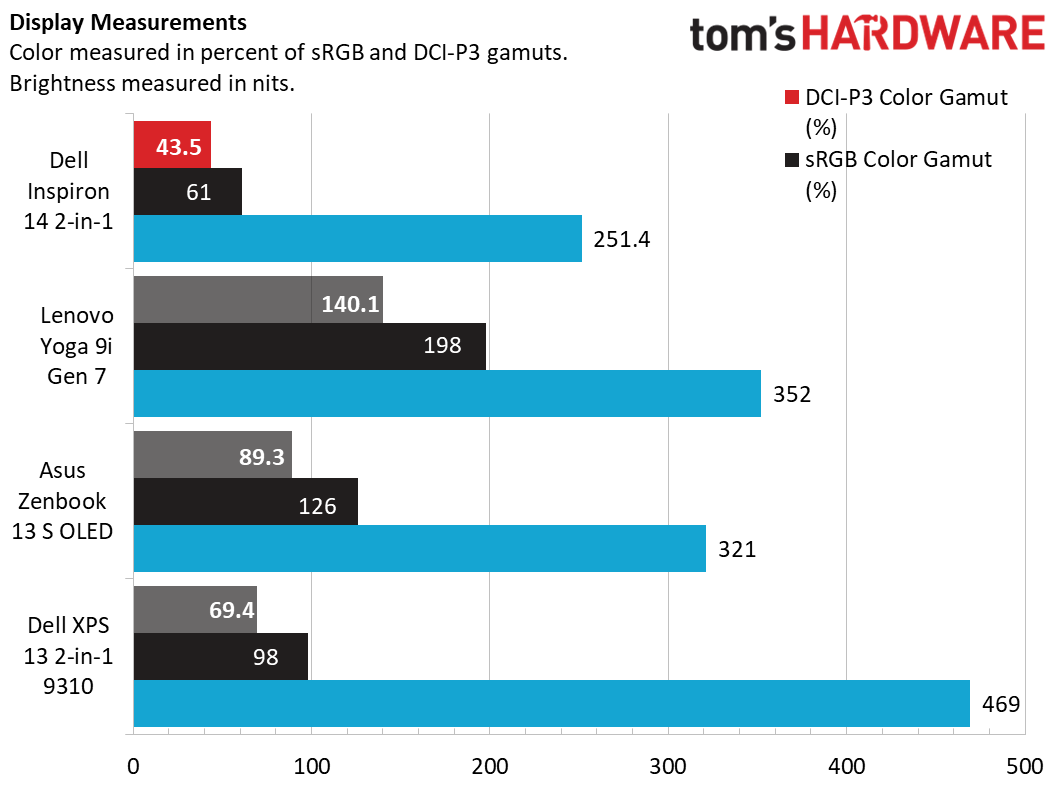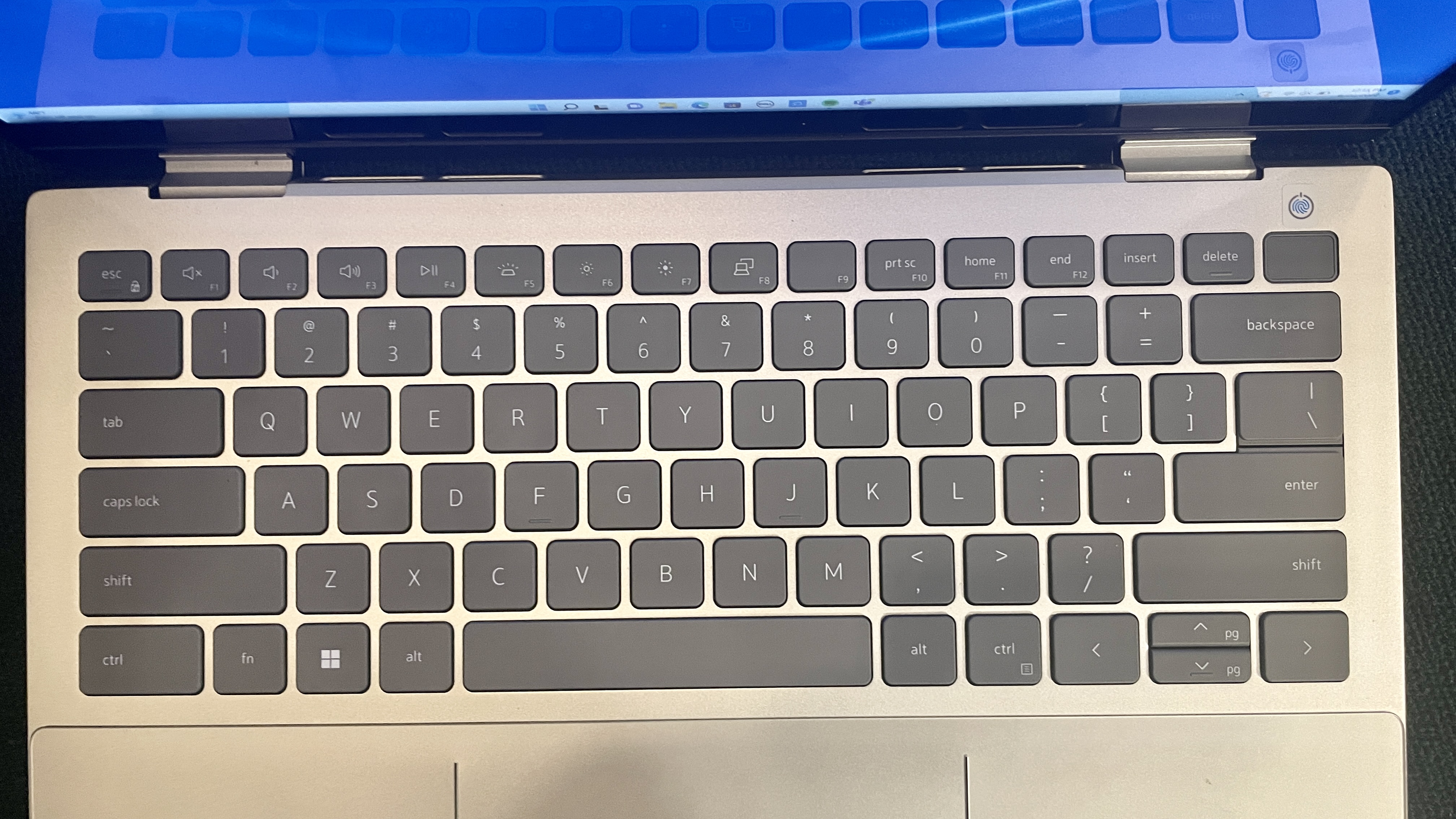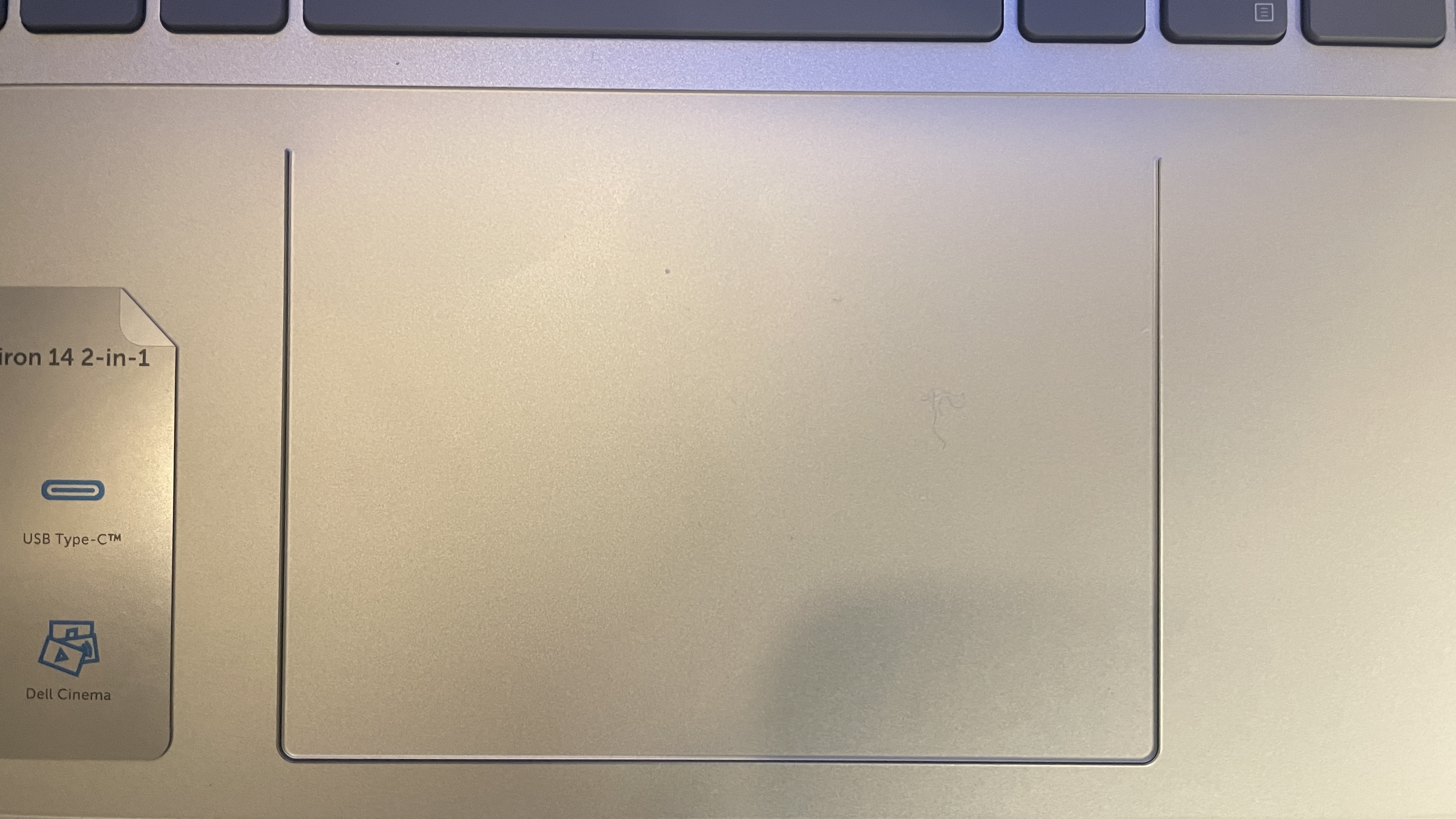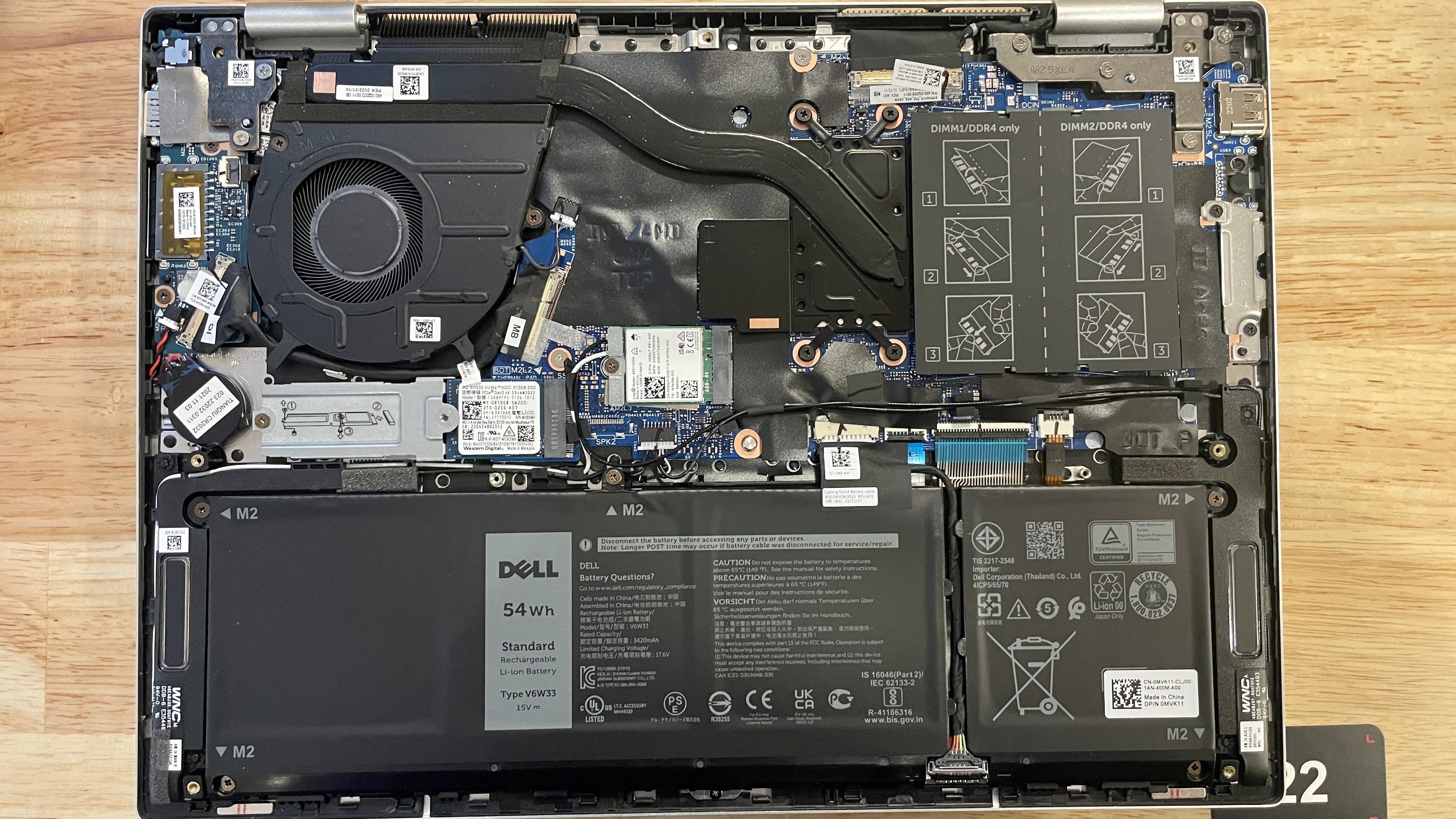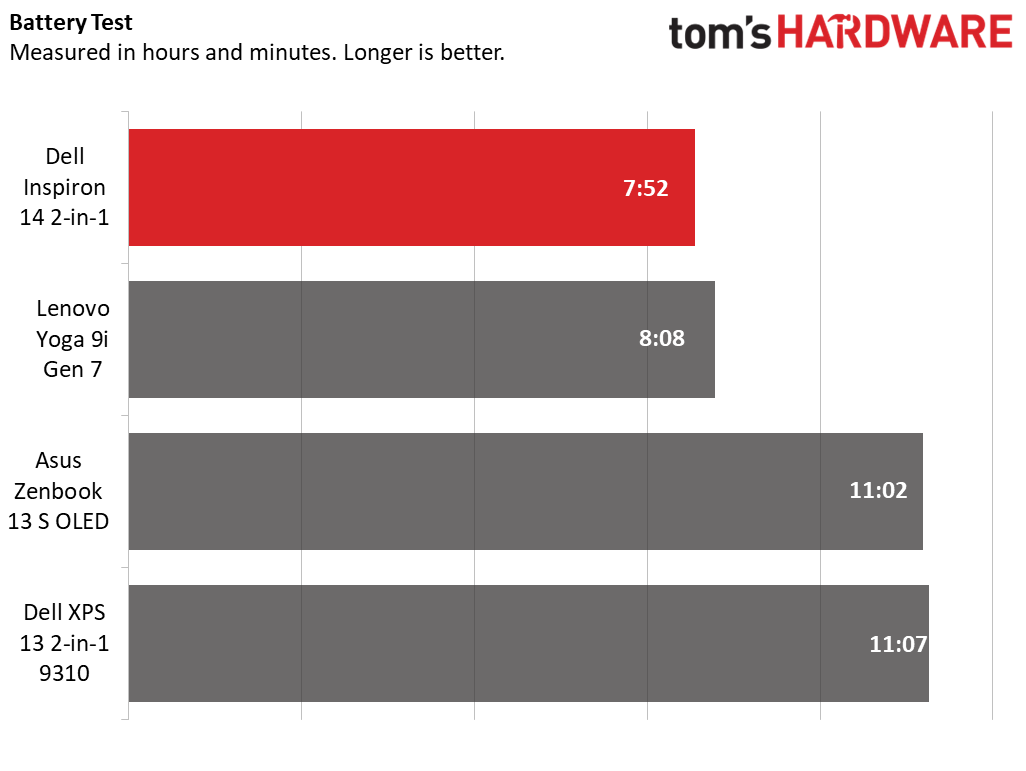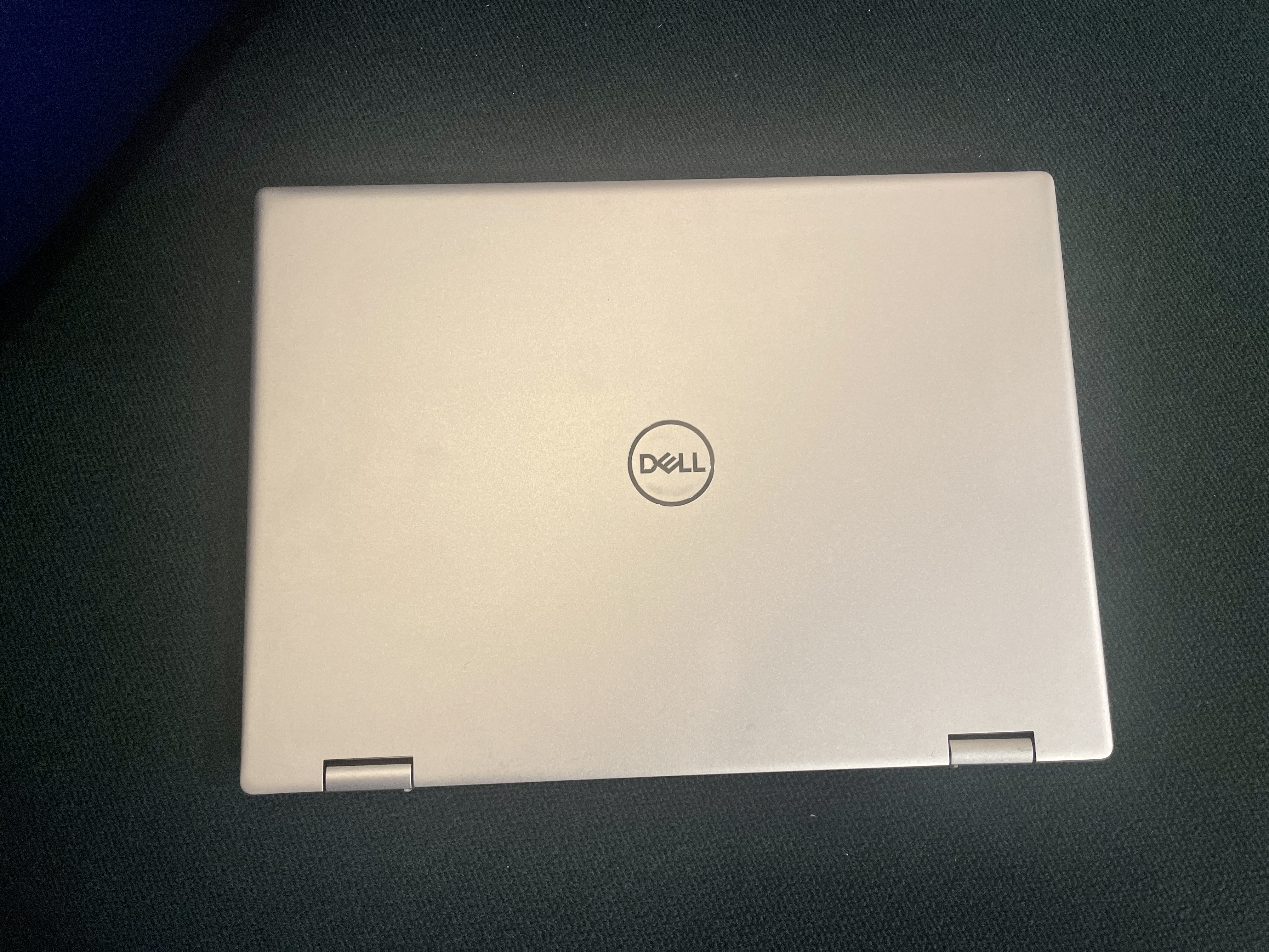Tom's Hardware Verdict
The Dell Inspiron 14 2-in-1 is a versatile, budget convertible with strong performance for the price. But it's light on niceties, and its battery life could be better.
Pros
- +
Great productivity performance for the price
- +
Comfortable keyboard
- +
Strong speakers
Cons
- -
Can get warm under load
- -
Dim display
Why you can trust Tom's Hardware
A good productivity laptop should be able to handle heavy work with the best ultrabooks on the market. The latest Dell Inspiron 14 2-in-1 ($849.99 to start, $1,049.99 as configured) is an impressive machine that can handle stressful workflows thanks to its 12th Gen Intel U-series processor. Aside from laptop mode, it can fold into a tablet, a tent, or a stand for creative use or media consumption, and it's portable enough to take with you anywhere and whip out like an e-reader.
Although it doesn’t have the niceties that you see on more expensive notebooks or convertibles, like an OLED display, the Inspiron 14 is an excellent budget 2-in-1 for productivity and creativity at a competitive price.
Design of the Dell Inspiron 14 2-in-1 (7420)
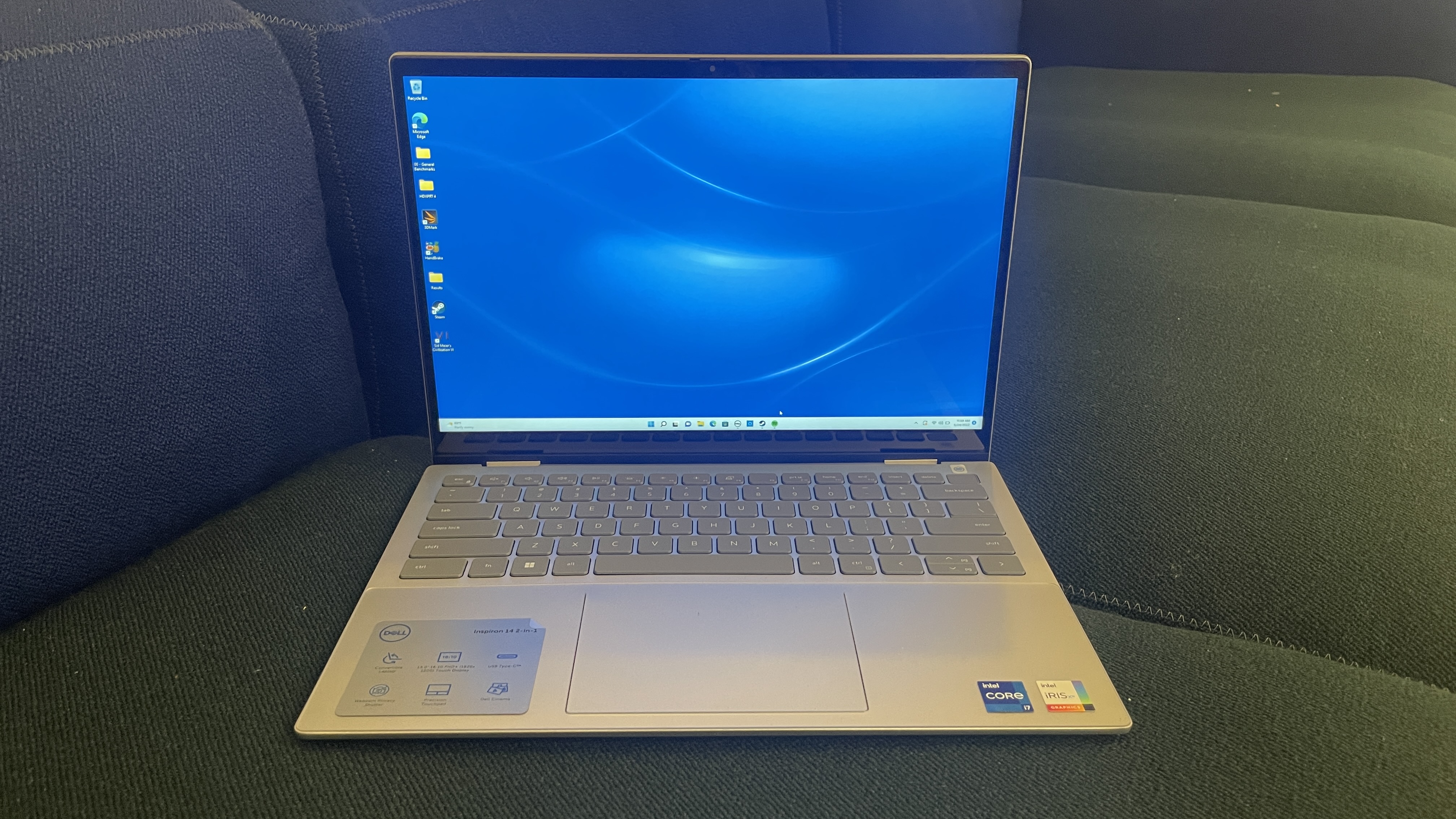
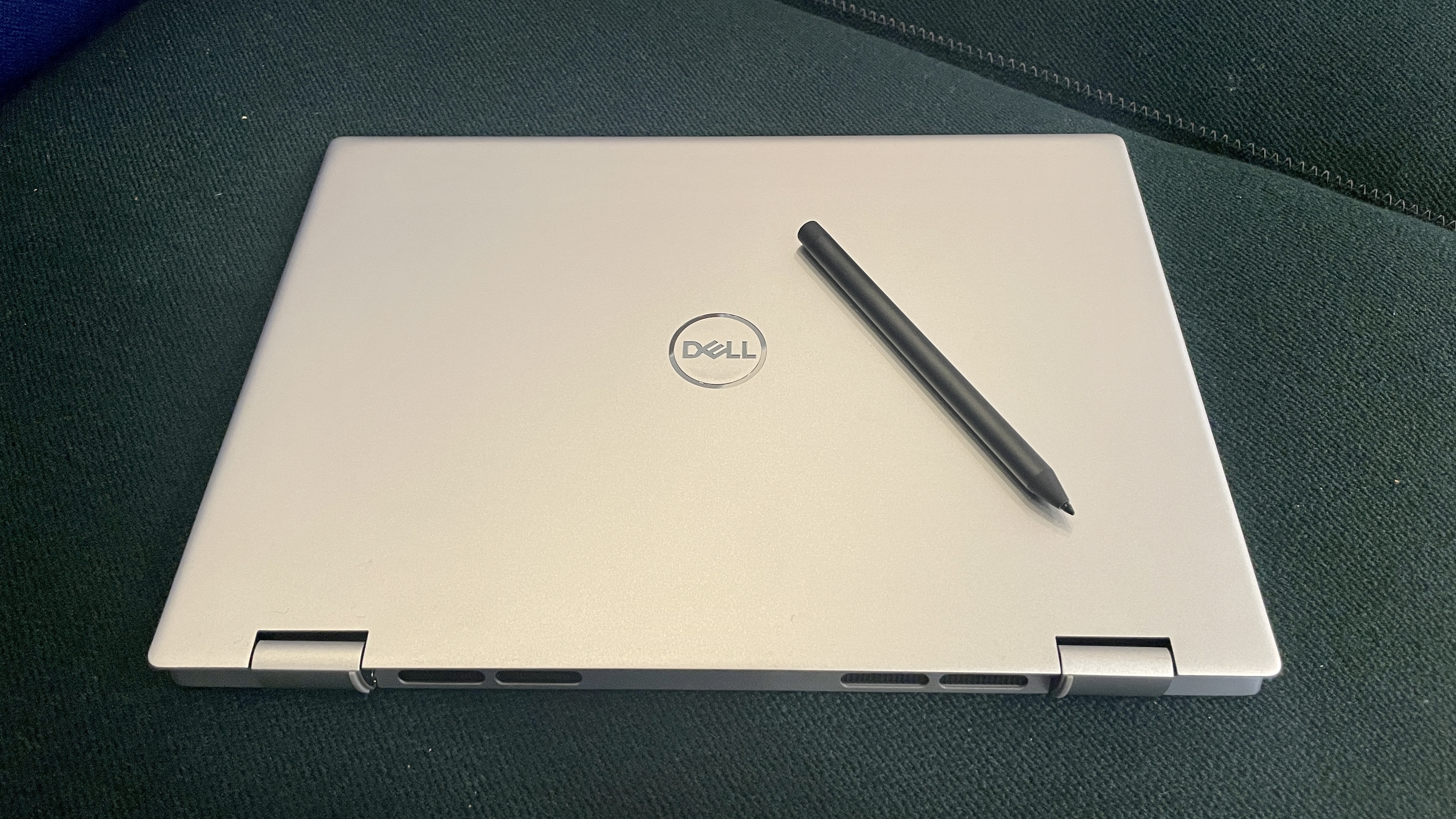
The Dell Inspiron 14 2-in-1 has a generic silver color scheme, similar to the previous model. In the center of the chassis is Dell’s polished circular branding, which gives the Inspiron a slightly classy appeal. Its 360-degree hinges have cutouts and are relatively noticeable, significantly reducing the otherwise streamlined design of the laptop. When you open the Inspiron, the gray caps from the keyboard go well with the laptop’s silver colorway, and the backlight behind it adds to the overall premium feel (while also helping you type in the dark).
Below the keyboard is an edge-to-edge mylar material that stretches across the palm rest and touchpad. Its smooth surface feels pleasant to lean on and keeps the surface where you keep your hands cool to the touch.
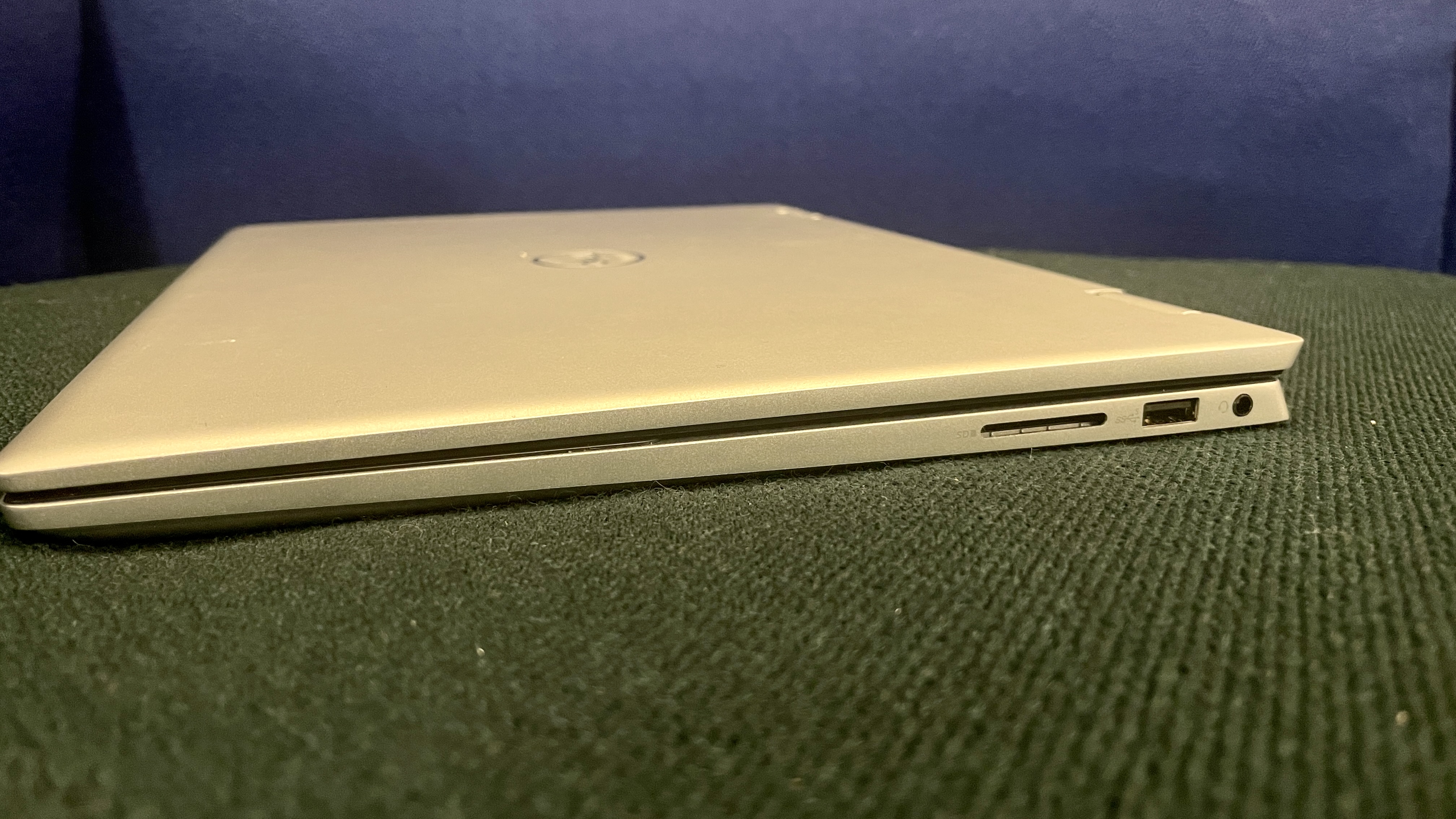
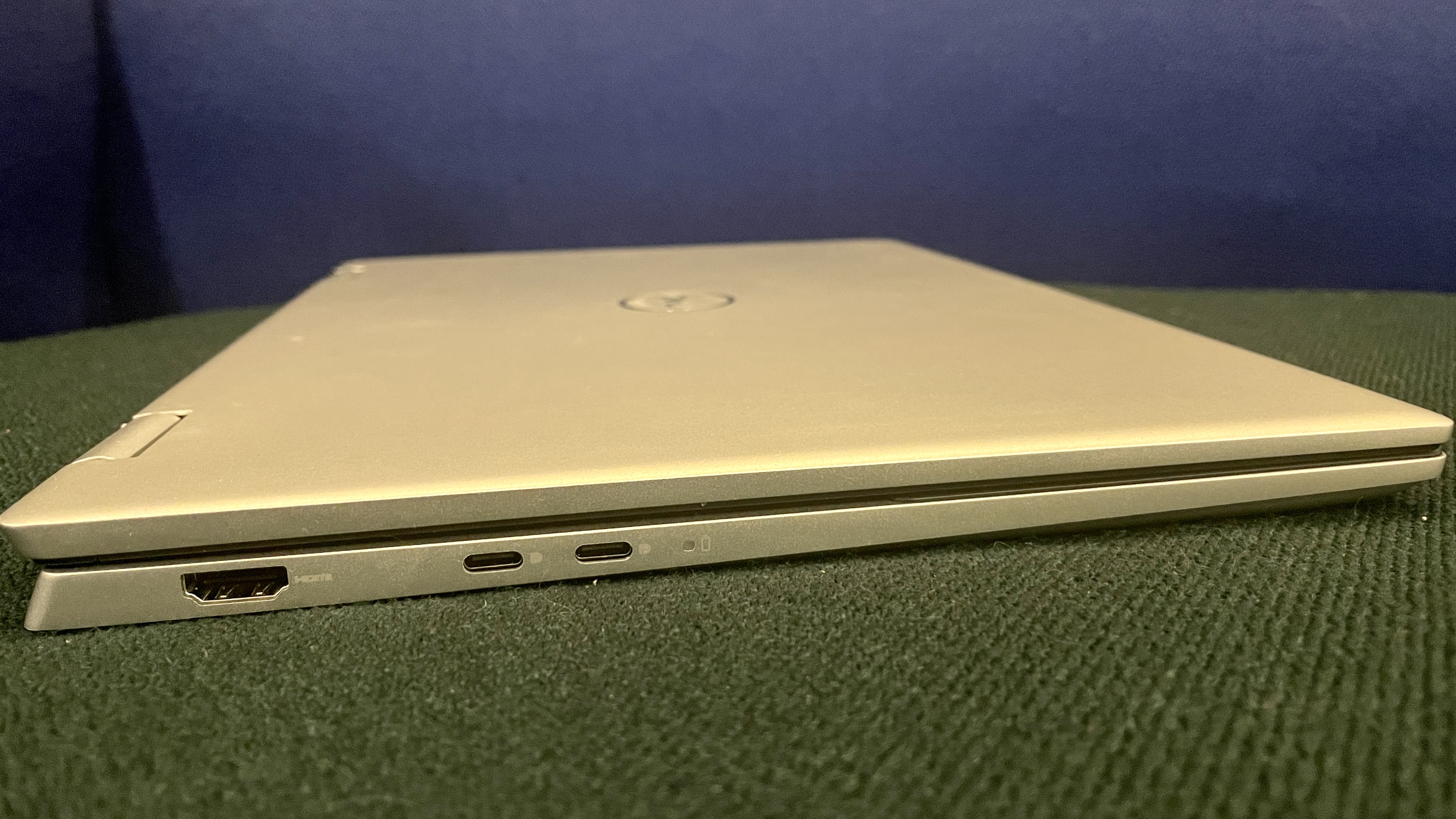
The left side of the Dell Inspiron 14 has an HDMI 1.4 port, two USB 3.2 Type-C ports with power delivery and DisplayPort capabilities (but not Thunderbolt 4), and an LED light indicating battery life. On the right side are an SD card reader, a USB 3.2 Type-A port and a 3.5 mm headphone jack. Although many slim ultrabooks are getting rid of ports in favor of a slimmer form factor, the Inspiron 14 has a robust selection. But you may need to grab a dongle of some sort just in case you need to connect to more than one USB-A port or add another USB-C port while you’re charging the device.
Although 2-in-1s are supposed to be compact, the Inspiron 14 is the heaviest out of all the rivals we compared it to at 3.49 pounds, slightly heftier than the Lenovo Yoga 9i’s 3.09 pounds. At 12.36 x 8.95 x 0.70 inches, the Inspiron remains roughly on par with the Yoga 9i’s 12.52 x 9.06 x 0.6-inch footprint. Meanwhile, the Asus Zenbook S 13 OLED comes in at 11.68 x 8.29 x 0.59 inches and 2.43 pounds, while the Dell XPS 13 2-in-1 9310 is 11.6 x 7.8 x 0.6 inches and weighs 2.8 pounds.
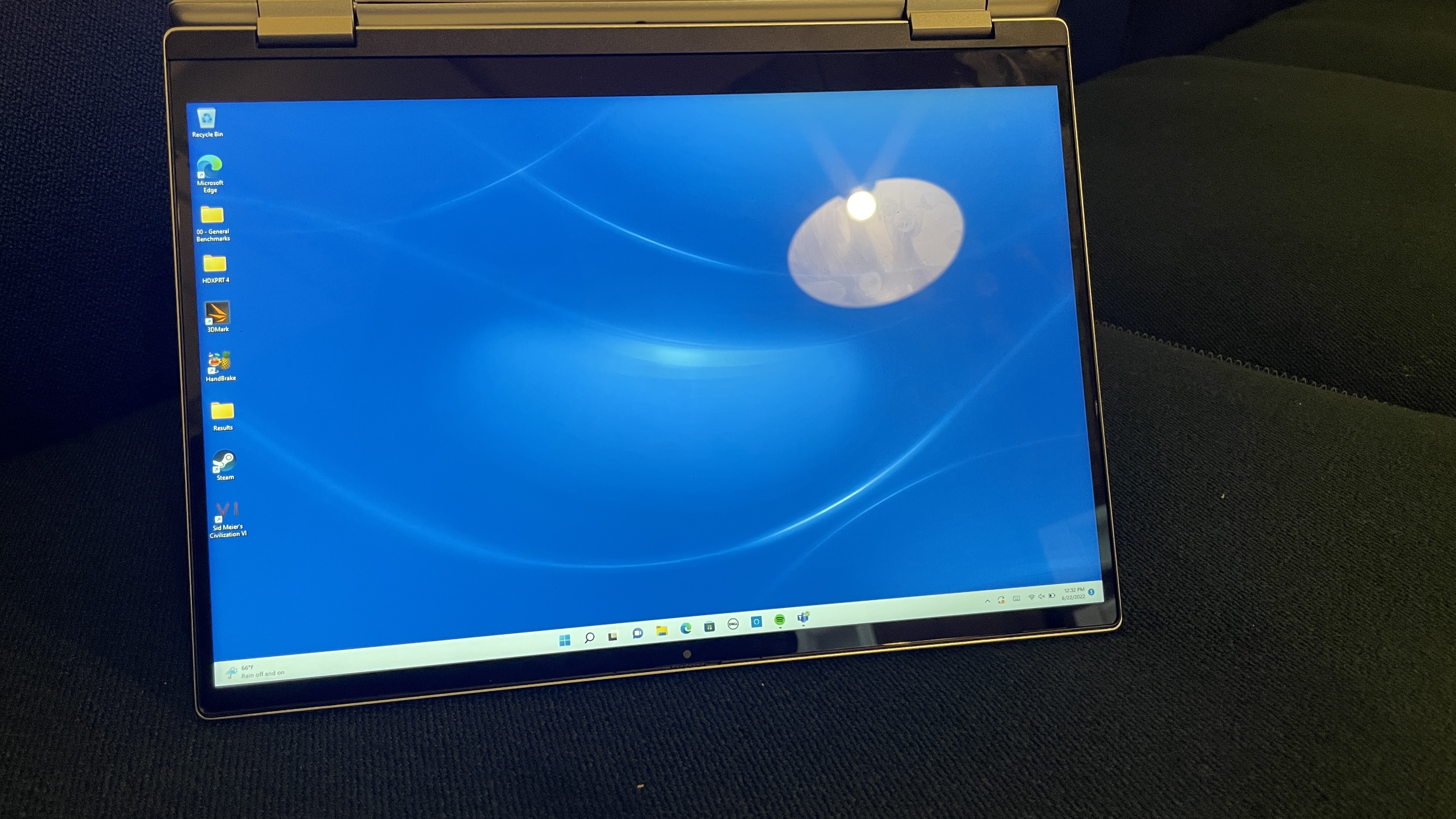
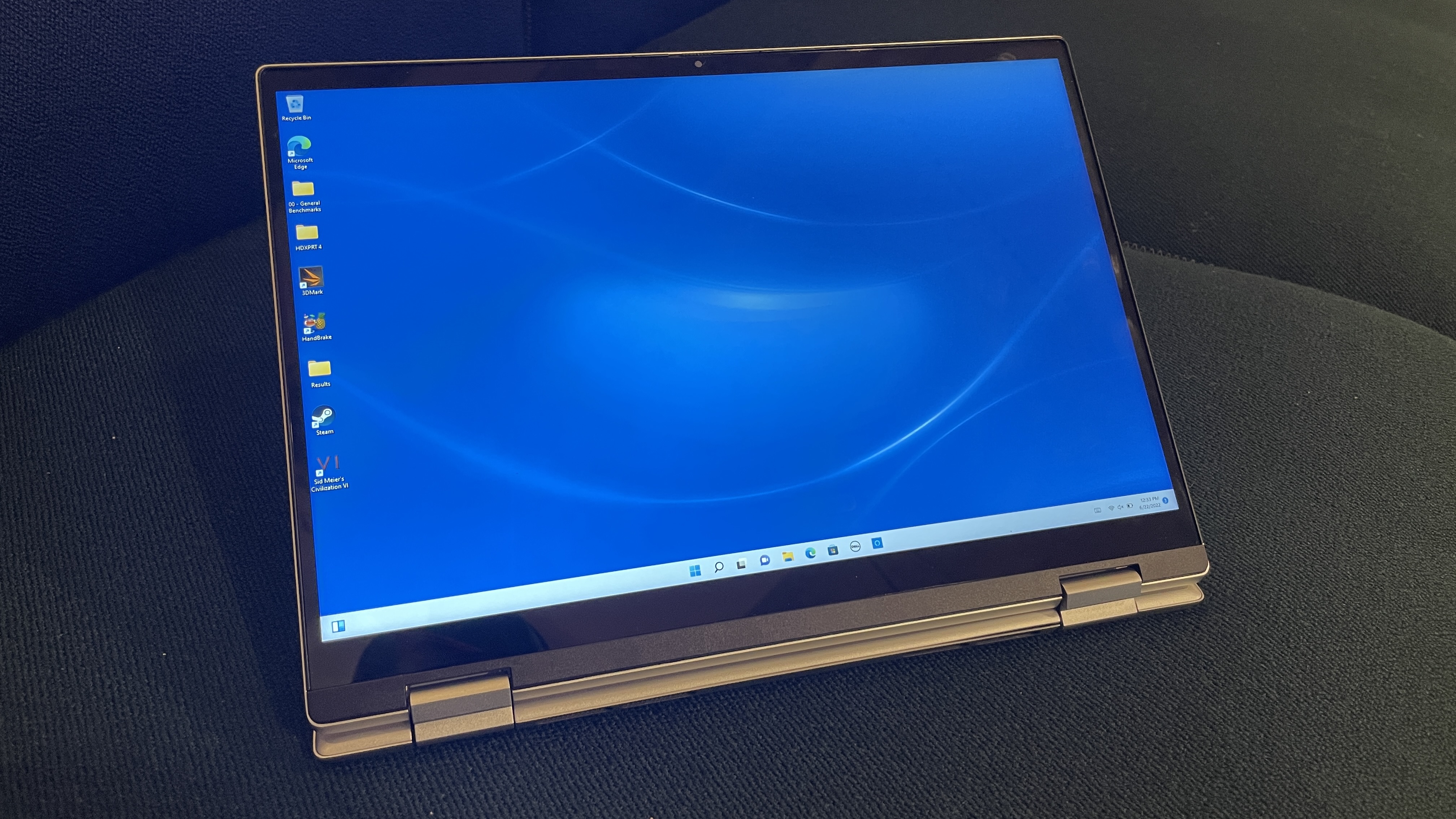
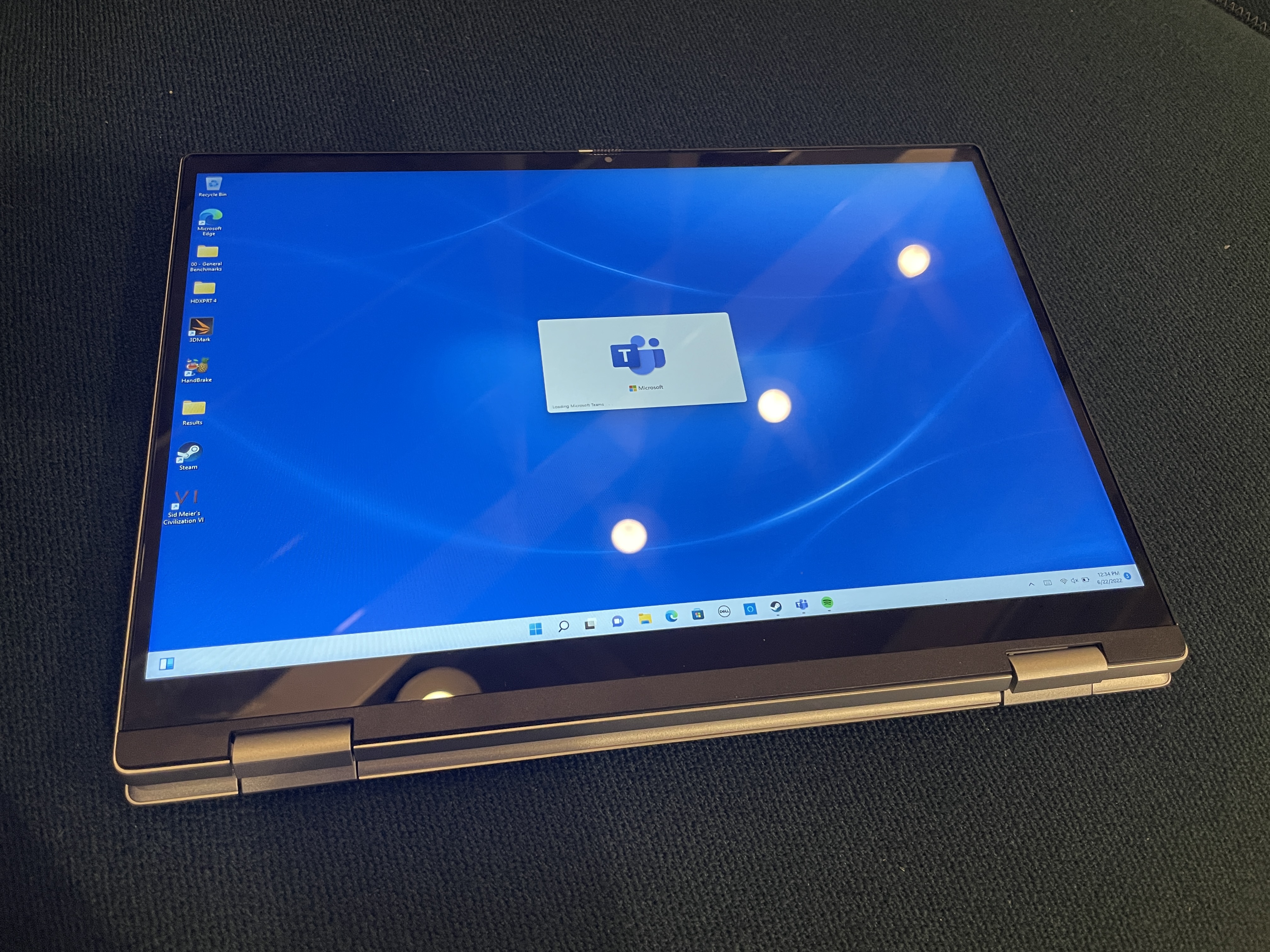
The Inspiron 14 2-in-1 can switch between four positions: a normal laptop, a tent mode standing on the system's edges, a stand mode where the device is angled on the keyboard, and tablet mode. Each position has its uses. I enjoyed using the Inspiron in stand mode while connected to another monitor for a dual-screen setup. In tablet mode, I could read articles up close, and I can imagine it being handy for artists.
Get Tom's Hardware's best news and in-depth reviews, straight to your inbox.
Dell Inspiron 14 2-in-1 (7420) Specifications
| CPU | Intel Core i7-1255U |
| Graphics | Intel Iris Xe (integrated) |
| Memory | 16GB DDR4-3200 |
| Storage | 512GB PCIe NVMe SSD |
| Display | 14-inch, 1920 x 1200 16:10 touchscreen |
| Networking | Intel Wi-Fi 6E AX211,160Mhz |
| Ports | 2x USB 3.2 Gen 2 Type-C, USB 3.2 Gen 1 Type-A, HDMI 1.4, 3.5 mm headphone jack |
| Camera | 1080p |
| Battery | 54 Whr |
| Power Adapter | 65 W |
| Operating System | Windows 11 Home |
| Dimensions (WxDxH) | 12.36 x 8.95 x 0.70 inches (314 mm x 227.50 mm x 17.86 mm) |
| Weight | 3.46 pounds (1.57 kg) |
| Price (as configured) | $1,049.99 |
Productivity Performance on the Dell Inspiron 14 2-in-1 (7420)
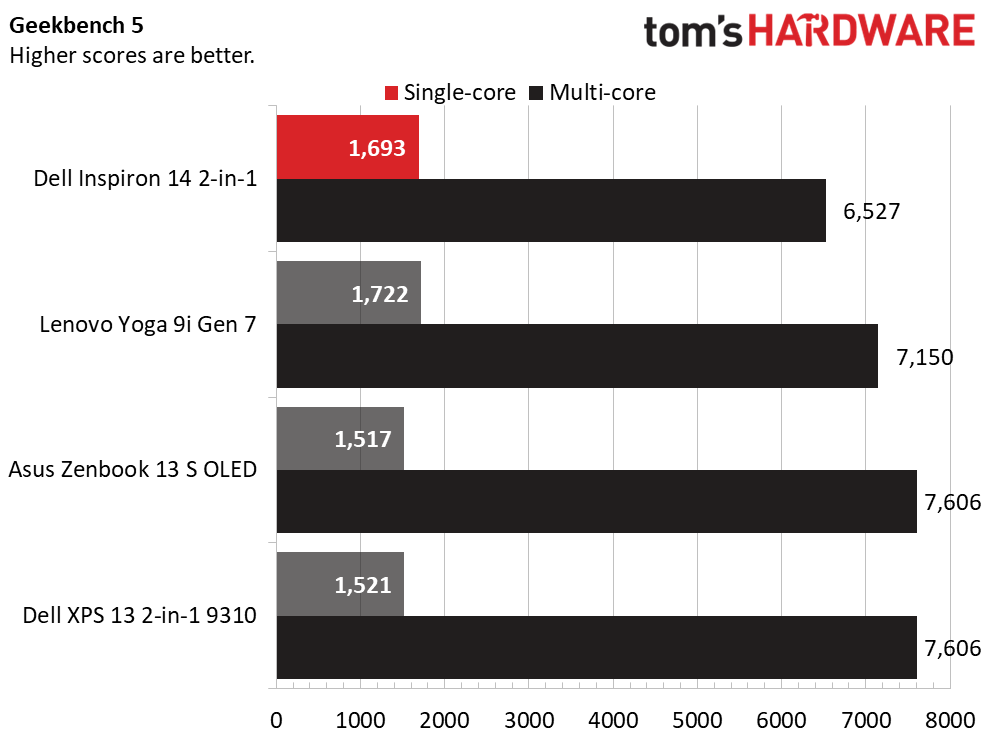
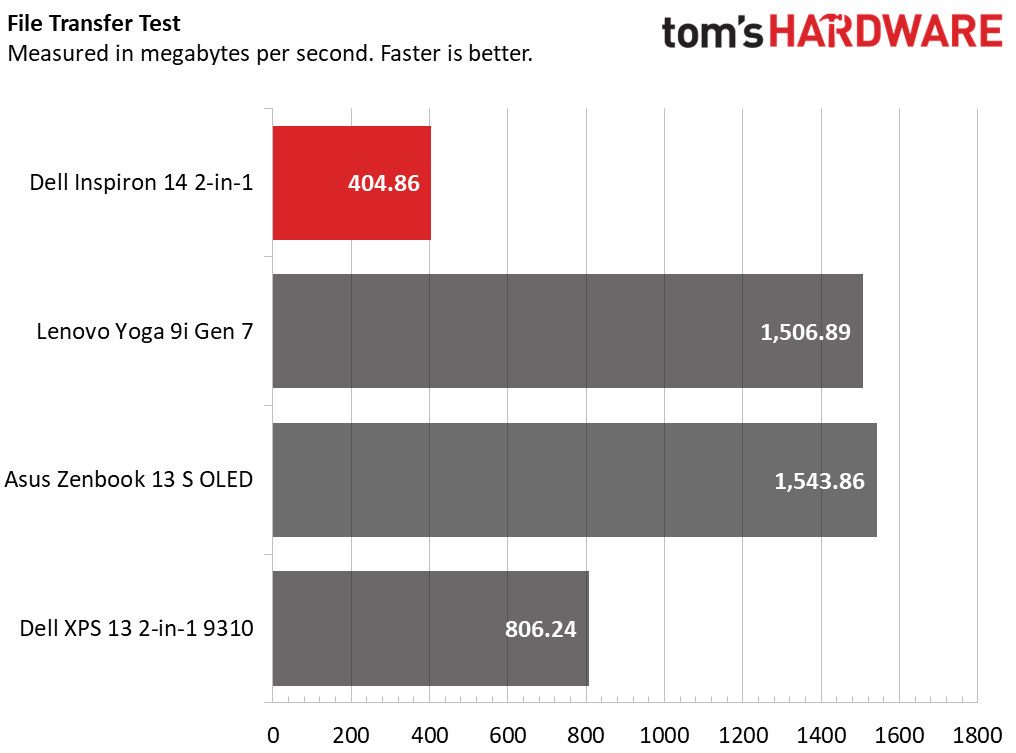
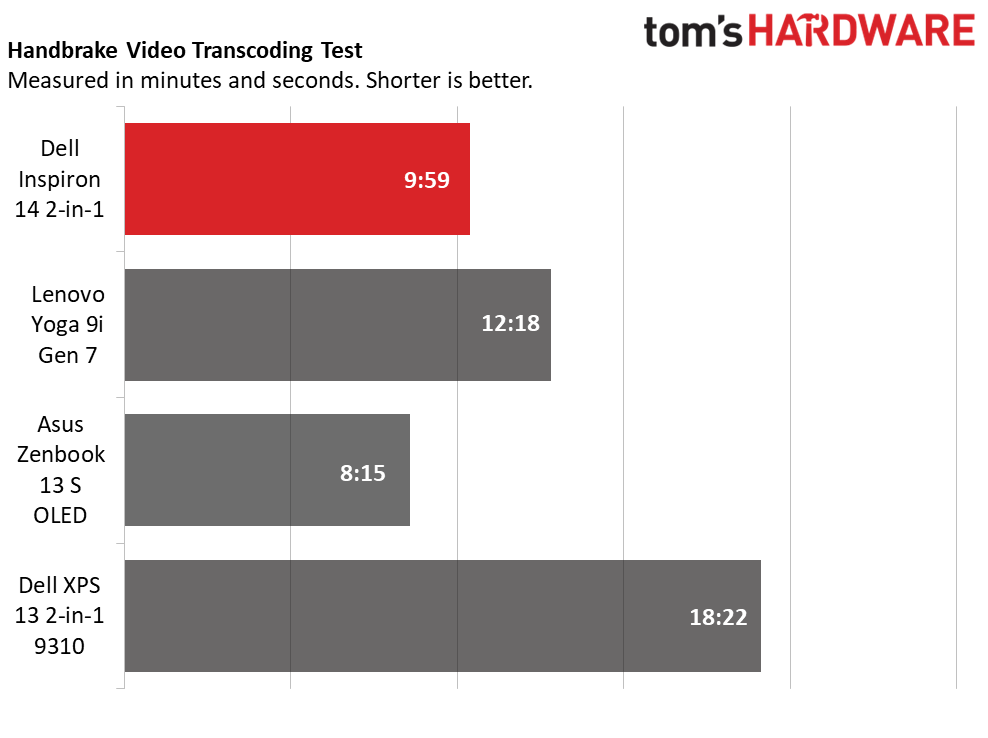
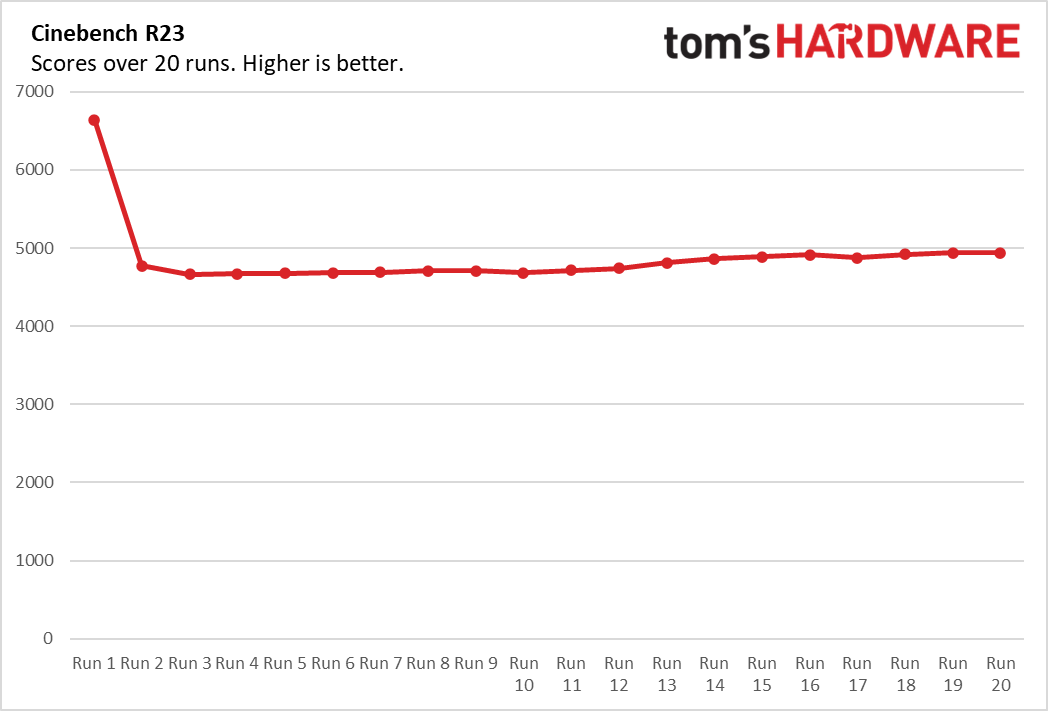
The Inspiron 14 2-in-1 is the first laptop we’ve tested with an Intel 12th Gen U-series processor. The convertible specifically uses an i7-1225U with ten cores (two performance cores and eight efficiency cores) and 12 threads. The Inspiron 14 also sports 16GB of DDR4 RAM and a 512GB SSD.
On Geekbench 5, an overall performance benchmark with heavy CPU focus, the Inspiron 14 notched a single-score score of 1,693 and a multi-core score of 6,527. Despite being cheaper than its competitors, the Inspiron completely outpaced some of them. It shouldn't be a shock, but the Inspiron outpaced the older XPS 13 2-in-1 ’s with an 11th Gen Intel Core i7-1165G7 (1,521/5,319). The same happened against the Asus Zenbook 13 S OLED’s Ryzen 6800U (1,517/7,606) in single-core scores, and that's one of the latest chips from AMD. It fell behind the Lenovo Yoga 9i Gen 7 and its higher-power i7-1260P processor, coming in with 1,722 single-core and 7,150 multi-core scores.
The Inspiron's SSD duplicated 25GB of test files at a rate of 404.86MBps, which is about half as fast as the Dell XPS 13 2-in1’s 806.24 MBps. The Asus Zenbook and Yoga 9i completely blew these two out of the water at over 1,500MBps each.
On our Handbrake test, we have laptops transcode a test video from 4K to 1080p. The Inspiron performed this task in 9 minutes and 59 seconds, the second-fastest of the bunch behind the Asus Zenbook 13 S’s 8:15. The Yoga 9i lagged behind at 12:18, and the Dell XPS 13 came in at 18:22.
To put productivity notebooks through their paces, we run the Cinebench R23 benchmark 20 times in a row and collect the scores to get an idea of how it performs under stress. The Inspiron began with a score of 6,642.90 before normalizing around the 4,800 range. Impressively, this is just about 100 behind the Yoga 9i on the same benchmark, with a processor that uses more power.
As Cinebench R23 ran, the Intel Core i7-1225U’s performance cores ran at an average of 2.01GHz, and the efficiency cores averaged 1.53 GHz. The CPU measured an average temperature of 68 degrees Celsius, sometimes jolting towards 87 degrees Celsius at the beginning of the stress test before settling in the high 60s.
Display on the Dell Inspiron 14 2-in-1 (7420)
The Inspiron has a 14-inch touchscreen with a 1920 x 1200 resolution and 16:10 aspect ratio. I watched Tears of Steel in 1080p on YouTube to test out the screen. The film has a lot of colorful moments, and although the picture was sharp, the screen didn’t capture the vibrance from some of this movie’s best moments. While the two main characters argued outside, the colors looked washed out and dim despite being a well-lit environment.
The leaves on the trees also lacked saturation, and all the neon lights on a ship after the film's 40-year skip didn’t pop much.
The Inspiron covers 43.5% of the DCI-P3 color gamut and 61% of the sRGB color gamut. It’s tough for the Inspiron to compete with the OLED displays of some of its competitors, though those are significantly more expensive. For instance, the Yoga i9 covers 140.1% of the DCI-P3 color gamut and 198% of the sRGB color gamut. The Inspiron’s results are closer to the older Dell XPS 13 2-in-1 and its LED touchscreen, which covers 69.4% of the DCI-P3 color gamut and 98% of the sRGB color gamut. That’s a much fairer comparison of what you’re expected to get from an LED touch display in this price range.
The Dell XPS display leads in brightness with an impressive 469 nits. The OLED displays of the Yoga 9i and Asus Zenbook aren't that far behind at 352 and 321 nits, respectively. The Inspiron 14 had the least amount of brightness at 251.4 nits.
The display's responsive touch function recognizes all my gestures well enough. There was no traction or streaks left when my finger swiped across the screen, and the surface felt smooth.
Keyboard, Touchpad and Stylus on the Dell Inspiron 14 2-in-1 (7420)
Convertible laptops need keyboards that are just as good as a clamshell, and the Inspiron 14 2-in-1’s isn’t too shabby. Although you’re bound to press a button or two in tablet mode, they don’t feel too distracting when you’re holding the device that way. Plus, the keys are automatically disabled outside of laptop mode.
Each keystroke has slight feedback that makes typing feel comfortable. I fluctuated between 50 and 55 words per minute on the 10fastfingers typing test, which is in the ballpark of my usual score on laptop keyboards.
The Inspiron 14 has gray keycaps and two-level backlights. There’s also a power button that doubles as a fingerprint reader. Otherwise, it has a pretty standard keyboard layout that feels pretty okay to type on. The keycaps feel nice, and although you have to bottom out to get your inputs across, the short travel distance didn’t bother me due to the feedback.
The Inspiron14’s precision touchpad is generously sized and smooth to the touch. I could execute gestures effortlessly, and the click mechanism felt snappy.
The Dell Active Pen PN5122W that came with our review unit is sold separately for $30. It weighs 0.72 ounces and operates with an AAAA battery included in the packaging. To install it, you unscrew the top of the stylus and insert the battery. Two extra pen tips (and a tool to remove the old ones) are included. The pen has two customizable buttons to which you can set commands by downloading the Active Pen Control Panel. Despite utilizing software, the stylus paired to the Inspiron instantly, before I even installed it.
I’m not the biggest fan of styluses. My writing is chicken scratch, and the auto-correction in Windows worked against me more than in my favor. I also found myself outpacing the scroll function that the laptop uses as you’re writing in Windows. I jotted some notes with the stylus in NotePad. I used it on web browsers to search on Google, and I often had to wait until it scrolled toward some free space before resuming my sentence. These are grievances more toward the software than the laptop, and for those who enjoy using a stylus to take notes or draw, the $30 Active Pen may be more beneficial to you.
Audio on the Dell Inspiron 14 2-in-1 (7420)
The speakers on the Inspiron 14 2-in-1 are impressively powerful. The stereo speaker cutouts are on the laptop's bottom, near the feet, so playing tunes on a bed won’t sound as great as when the speakers are bouncing off a desk. In my testing, Drake’s “Texts Go Green” had fantastic, loud vocal clarity, but the rhythmic kicks also had a strong punch behind them. The rest of the percussion, from the high hats to the bongos, was incredibly sharp, and the synths were buttery smooth.
MaxxAudio Pro’s software gives you access to an EQ, several presets, and knobs that adjust bass, details, and width. If you’re streaming music, some buttons reduce noise and elevate treble. I found the EQ profile valuable, but these speakers can’t handle the added effects of the bass and details knob and are better suited for when you’re using headphones or external speakers. The app also has Waves Nx 3D Audio, which utilizes the webcam to deliver sound to your position. The last tab on the app allows you to adjust your microphone volume, reduce noise, and set profiles like conference room and recording mode based on your environment.
Upgradeability on the Dell Inspiron 14 2-in-1 (7420)
There are seven visible Torx screws on the bottom of the Inspiron 14 2-in-1. After unscrewing them, I realized the top three screws are captive — they're attached to the lid and don’t come out. Once open, I could see the battery, which is unfortunately integrated into the laptop on the bottom, and two RAM slots covered by heat shielding with instructions on how to upgrade them and what’s compatible.
There are also instructions on removing and upgrading the M.2 2230 SSD on the attached bracket (it's unclear if all configurations will use the bracket and a shorter SSD). You could use a longer SSD here and leave out the bracket.
Battery Life on the Dell Inspiron 14 2-in-1 (7420)
The Inspiron 14 2-in-1 doesn't stand out for its battery life. During our battery benchmark, which continually browses the web, streams video, and runs OpenGL tests over Wi-Fi at 150 nits of brightness, the Inspiron 14 2-in-1 held out for 7 hours and 52 minutes. The Yoga i9 stayed on longer, lasting at 8:08. But both machines were severely outperformed by the Zenbook 13 S’ time of 11:02 and the Dell XPS 13 2-in-1’s 11:07.
Commuters who need more than 8 hours of unplugged up time will, though, appreciate that the Inspiron 14’s 65-watt charging brick is small and travel-friendly.
Heat on the Dell Inspiron 14 2-in-1 (7420)
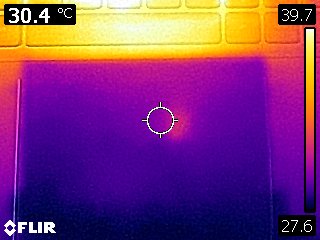
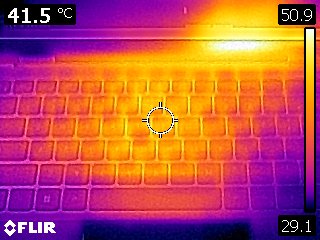
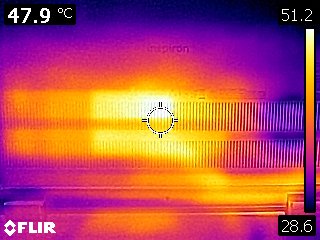
The Inspiron 14 2-in-1 is a device you will use on your lap or, at the very least, hold in your hands in tablet mode, which means good heat management is crucial. During our Cinebench stress test, the touchpad was the coolest area at 86.72 degrees Fahrenheit. At the center of the keyboard, between the G and H keys, the laptop reached 106.7 degrees. The underside of the Inspiron hit temperatures of 118.22 degrees Fahrenheit and was the hottest area of the laptop. Overall, the Inspiron can get pretty warm under intense workloads. While I was running Cinebench, the Inspiron was hot to the touch, especially around the keyboard, the closer the keys got to the vent under the display.
Webcam on the Dell Inspiron 14 2-in-1 (7420)
The Inspiron 14’s 1080p webcam provided a clear image, as I could see myself sharply and even some of the buildings in the window behind me. However, the colors were muted, and nothing popped in the office except for the reflection of the lightbulbs. It’s a serviceable webcam that will cary you through video conferences and other quick video calls. But, like most laptops, it doesn't match the abilities of cameras on our best webcam list.
A physical camera shutter slides over the lens when you're not using it, which is good for the privacy-conscious.
Software and Warranty on the Dell Inspiron 14 2-in-1 (7420)
There's not much software preinstalled on Dell's 2-in-1. I didn’t even find the usual Windows 11 bloatware I’m used to seeing on new devices. I did find some Dell software of varied usefulness, though. Dell Customer Connect delivers surveys, and My Dell allows users to register their system for the warranty or find their Dell Service tag. Lastly, there’s Dell’s SupportAssist app, which provides automated support and assists customers with their device.
MaxxAudio Pro by Waves, which I mentioned in the audio section above, allows you to customize audio and microphone levels.
The Dell Inspiron 14 2-in-1 comes with a one-year limited warranty.
Dell Inspiron 14 2-in-1 (7420) Configurations
Our configuration of the Inspiron 14 2-in-1 came with an Intel Core i7-1255U, Intel Iris Xe integrated graphics, 16GB of DDR4 RAM, 512GB of SDD storage, and a 14-inch 1920 x 1200 touchscreen for $1,049.99.
There’s also a weaker base configuration available with an i5-1235U processor, 8GB of RAM, and 256GB SSD storage for $849.99.
Bottom Line
The Dell Inspiron 14 2-in-1 is a fine convertible laptop capable of performing with some of the best 2-in-1, often pricier, clamshell ultrabooks on the market. That said, the Inspiron 14’s 12th Gen U-series processor wasn't quite as powerful as the Lenovo Yoga 9i’s 12th Gen P-series CPU under some workloads.
Still, for the money, the Inspiron gets pretty close. It even transcoded a video from 4K to 1080p faster than the Asus Zenbook 13 S and its 6800U processor, the latest from AMD. The Inspiron may not have a great, bright OLED display like the Zenbook and Yoga 9i, but it’s also significantly cheaper than both, so you have to give something up.
The Inspiron didn't do as well on our file transfer test as its competitors. Its 54 WHr battery also fell short of the eight-hour mark in our testing. Overall, the Inspiron 14 is a solid productivity choice to save some cash. It’s a 2-in-1 ultrabook that handles CPU-heavy tasks admirably, but at a lower price with fewer frills.

Isaac Rouse is a staff writer at Tom's Hardware. He reviews laptops and various gaming peripherals.
-
Xajel It's very sad that they removed TB altogether.Reply
Even the previous ones, only the higher-end i7 version has it. But this year, nothing even for the i7 version. And the AMD version uses the older Ryzen 5000 series because the newer 6000 requires DDR5.
